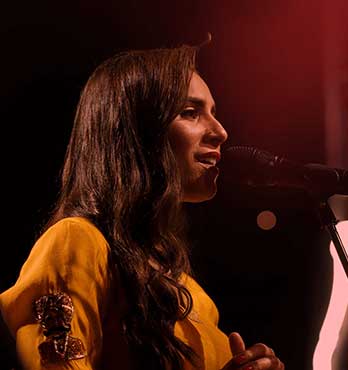Zoe Viccaji

by Ayesha binte Rashid
Zoe Viccaji wrote her first song when she was 15 years old, an adolescent grappling with the grief that followed after losing a companion of over a decade - the family dog. This was an experience of familial loss that was new for the young Zoe; the Viccaji family had adopted the dog when she was 3 years old. Zoe called the piece ‘Angel’, a song that she eventually performed for her first solo performance at an open mic event during her A ‘levels. Singing along to a guitar, she thereafter became known as the ‘Girl With The Guitar’. Later, during her first week at Hamilton College in New York, Zoe performed the same song at a college event.
“I was in this performance hall and I sang the song and there was absolute silence. When I stopped, everyone stood up and they clapped and I was like, ‘What?! These guys actually liked this?’” she recalls of the performance.
The standing ovation came as a surprise for her, but may not have been unwarranted, considering that Zoe had been performing long before she ever stepped on a stage, putting on shows for imaginary audiences with her siblings as a child. “When we were really small, I don’t know, 5 or 6 [years old], we used to memorize [songs] by heart, create a stage and sit all our toys in front of it,” she remembers fondly, “We used to sing to all our dolls, teddy bears, and stuffed animals. That’s how it started.”
Not soon after, the siblings were performing for live audiences. Zoe and her brother would write musicals and perform them in their drawing room, charging their parents, neighbors and friends to come and watch the productions. They would have a little tiffin box at the entrance of the drawing room in which their guests would deposit Rs. 10, contributing towards the children’s collective fund.
“Now it’s what I do for a living. I learn songs, my own songs, and I’m performing for a live audience. I think maybe this was written in the stars from a long time ago,” Zoe says, looking back at the trajectory of her life.
For a long time, while music may have been an immersive passion for Zoe, it remained a hobby. Having grown up around music in the family, this was just a natural progression for Zoe, as her mother and brother had both taken up the guitar and singing as hobbies. Music is one of the ways the Viccajis enjoy life altogether. At family gatherings, someone would bring out a guitar, someone would start playing a piano, and everyone would inevitably join in the singing. Music is also a part of prayer and worship in the Christian community, and for Zoe this meant being in her church’s choir, later going on to join a 70-person choir in college that toured internationally.
Zoe’s personal musical tastes included Alanis Morisette, who gave voice to her teenage angst, and Sarah McLachlan, who gave her solace and planted the first seeds of a desire to make songs: “When you hear a song and you get goosebumps, then you just know that there’s something magical happening here. That’s when I realised that I want to be doing that to people, I want people to feel and be transported into a place with music.”
The first cassette Zoe ever bought in her life was Sajjad Ali’s Babia, but it was when she went to college that her foray into the world of Eastern music began. Homesick, Zoe turned to Ustad Nusrat Fateh Ali Khan in her search for a feeling of home, listening to Night Song, his album with Michael Brook, and that’s when she started falling in love with Eastern music.
While at college, Zoe started using her summer trips to Pakistan to begin working on her first album with producer Shahi Hassan. She released her first single, Thinking About You, when she returned from college in 2009. Even then, music remained a hobby: “It was screaming at me that this is what I should do but I was always trying to, as a career, do what was a ‘better choice’ ... It takes a lot of things to get [the] self-belief and know that you’re good at something, apart from just that you enjoy it.”
The chance for the hobby to transform into something more presented itself in the summer of 2009. In what felt like a moment when the stars aligned, Zoe auditioned for the role of Mama Morton in Nida Butt’s production of Chicago. She landed the role and went on to dazzle her home city with musical theatre. Her vocal chops were noticed by Coke Studio and Zoe was brought on as a backing vocalist in Season 2 -- the beginning of what would be a relationship that continues to this day. At Coke Studio, a colleague told her about a project that was accepting reinvented versions of old songs and Zoe decided to send in her own rendition of Strings’s Mera Bichraa Yaar.
“I loved [the song] because of the lyrics. My production skills were very limited, I couldn’t play drums and play enough to record so I made the whole song in my voice in acapella. They loved it so much, they said this is how we should do it and the song did really really well. I realised I can do this, this is doable.”
Less than two weeks after Mera Bichraa Yaar debuted on radio, Zoe performed for the first time as ‘Zoe Viccaji’ at the Pakistan American Cultural Center in Karachi. The hall was packed, with no room to sit, 300 people standing, all present for the ‘Girl With The Guitar’ – with the auditorium filled to full capacity, people had to be turned away at the gate. An overwhelmed Zoe got on stage and, faced with the crowd, said, “Wow, wouldn’t it be really embarrassing if I started crying right now?”
“I was so nervous; my knees were buckling under me. I was holding either a lyric sheet, or the mic in my hands and they were shaking uncontrollably,” she remembers. After the first few songs, however, the nerves disappeared as she fell into the performance and, since then, she’s never looked back. “That was a huge turning point in my life. Coke Studio, Bichraa Yaar [and] the musicals, all three made me realize that I wanted to do music full time.”
Today, Zoe is a multi-talented artist; her Coke Studio experience interwoven with her personal aesthetics gave birth to an artist who creates a versatility that allows her to cross genres. Having studied under the tutelage of Naseeruddin Saami and his son, Rauf Saami, Zoe has expanded her repertoire to include Eastern melodies and techniques. “I was growing up in a household with western music, with jazz and pop, but no exposure to Eastern Classical. Rauf would come over to our house every day and basically just open us up to this world of Eastern Classical. The kind of strengthening that does for your voice is something that helps you in any genre of singing.”
A perfectionist when it comes to her delivery of Urdu, Zoe is always looking to polish her vocabulary and pronunciation, recently doing a course with Zia Mohiyuddin to study the language. Her songs sometimes go through three stages of corrections – she learns the words and sings them to three different people in three different stages, incorporating feedback and corrections to her pronunciations at each stage.
To this day, Zoe holds onto the memory of what Sarah McLachlan did for her, the solace that McLachlan’s music provided for her, a solace that she still finds in music. For Zoe, music is a form of meditation - it’s a space that is a little disconnected from the real world, a quieter space that helps unclutter her mind and centers her. When she creates music, she wants to give to the world what music has given her and what artists like McLachlan did for her – now, it’s her who hears from people about how her music has helped them through difficult times and that’s what keeps her going. “That’s why I started music, because I wanted to be an emotional support to people,” Zoe says.
In music, Zoe has found the best possible tool for this: “Music is a mood-altering phenomenon. It can make you happy, it’s filled with nostalgia ... it gives you comfort. I think this is where my real feeling for wanting to do music comes from. It’s like you can feel what it means to feel, if that makes any sense.”
